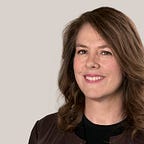The Brightest Nail Polish I Can Find
I know you’re supposed to dread turning 50, particularly if you’re a woman. But that wasn’t my experience. Sure, I went to sleep a bit earlier on my birthday this year than I did 25 years ago. But I did so with no less enthusiasm for the years ahead. If anything, that enthusiasm was more deeply rooted and focused thanks to the decades of experience, friendships and wisdom I’d acquired.
I just wish the industry in which I’ve acquired most of that experience, friendship and wisdom was as enthusiastic about my future as I am.
Looking around the ad business today, I see fewer and fewer women my age. And I’m not seeing a lot of interest in advertising to them either. What is it about turning 50 that makes women so undesirable — or at least invisible — to the advertising industry?
Let’s look at some stats: Every fifth adult in the U.S. is a woman over 50, and those women represent a total net worth of more than $19 trillion. (That was the number the last time anyone measured it, which was 2007. We can assume it’s quite a bit higher today). Once college bills are paid, women over 50 spend 250 percent of what the average consumer spends. Overall, they are the healthiest, wealthiest and most active generation of women in history.
Yet less than 5 percent of advertising dollars in the U.S. goes toward Baby Boomers, according to a 2014 Nielsen study. I wish I could tell you how much goes specifically to women over 50, but no one has bothered to measure that.
The stats for women working in the industry are similarly dire. One in 3.5 of us jumps or gets pushed out of the industry by the time we reach 50, usually making a move into consulting or freelance. That figure by 2020 is expected to rise to 1 in 2.
I heard those industry stats at an executive class retreat hosted by SheRunsIt (formerly Ad Women of New York) that I attended earlier this month. I would say the average age of attendees that day was about 47, and about half said they were “between successes,” as they delightfully put it, or feeling the need to dust off the resumé and update the LinkedIn bio. That’s a huge amount of senior talent on the street, prepping for their next role or actively insulating themselves in their current role.
What advice did these women say they were being given? List only the last 15 years of work experience on your resume so potential employers won’t know your age. Seriously? It reminded me of columnist Connie Schultz’s Ted Talk, in which she recalls being advised to use neutral nail polish to avoid calling attention to her hands, which would give away her age. “If my hands were going to telegraph something about me,” she says, “I am going to wear the brightest color I can.”
Frankly, I’m with Schultz. And as one of the world’s youngest 50 years old, I feel authorized to present some observations of my own.
I believe that women turning 50 now are facing a different future than those who came before us. These stats and the horrible, condescending advice feel painfully out of date, the lingering cultural vestiges of a rapidly receding age. In just the last 12 months, we’ve seen the #MeToo movement usher in an era of zero tolerance for sexual harassment. Is it so hard to believe that the scourge of ageism could one day be equally unfashionable?
Much like the brave women who refuse to stay silent about the abuse they’ve received at the hands of powerful men, the onus is on us to refuse to be sidelined. Luckily, within our industry are several remarkable women — Cindy Gallop and Kat Gordon, just to name a couple — showing us how it’s done.
Likewise, the women at the SheRunsIt event were not grim, defeated or desperate. They were hopeful, open and supportive. To me, the message of the day was, “Stick together and we will create our own opportunities.” And I believe we are doing just that.
There’s a hidden truth behind one of those statistics that says a lot. Of the one in 3.5 women who become consultants or freelancers when they turn 50, many are doing it by choice. Fed up with the lack of opportunity afforded them in established companies, they are taking matters into their own hands, launching independent ventures that let them charge handsomely for the wisdom they’ve accrued.
It may not be the answer to ageism in the ad industry. But for now, it will certainly buy a lot of nail polish. Today, I’m wearing bright orange.
